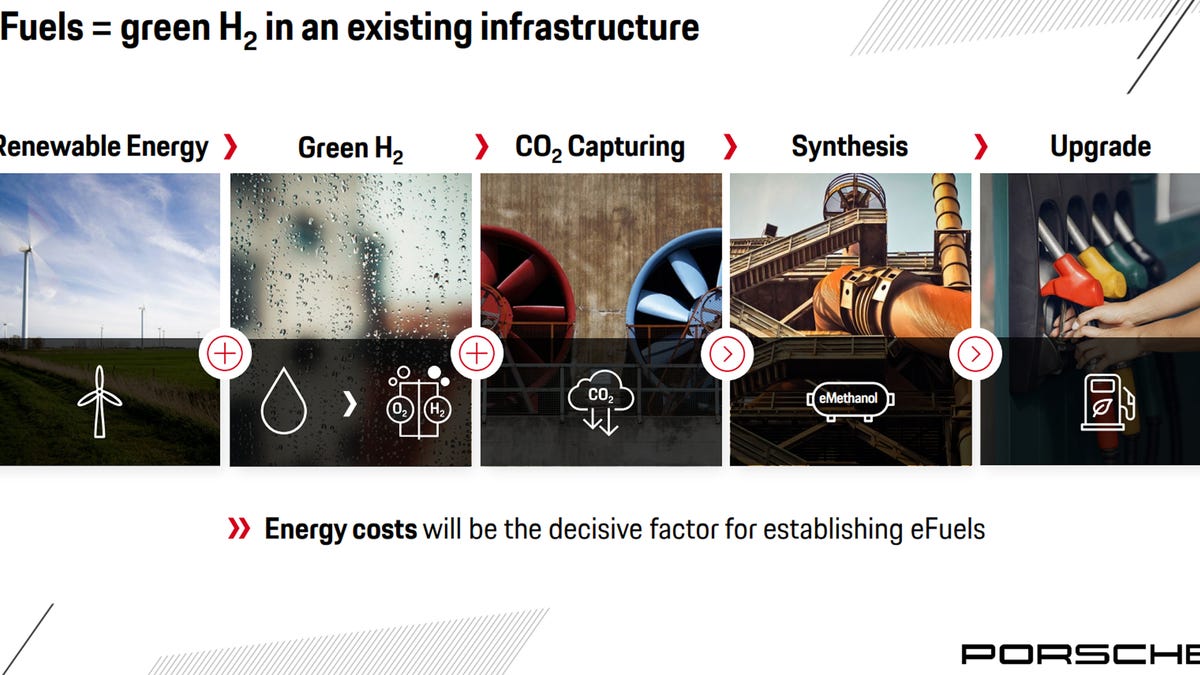Porsche's eFuel could be a climate game-changer
Carbon-neutral gasoline? Sounds good to us.

Porsche's eFuel could help clean up today's fleet of internal combustion-powered vehicles.
Internal combustion may be yestercentury's technology, but cars and trucks running on dinosaur juice will continue prowling the world's roadways for decades to come -- though they may get a lot cleaner in the coming years. Porsche, along with a constellation of partners, is working to commercialize a carbon-neutral liquid fuel, which could be an environmental game-changer if scaled up.
Plainly named but patently cool, eFuel is a synthetic gasoline that burns exactly like the traditional stuff yet has minimal environmental impact. "We pursue eFuels as a complement [to electrics]," said Jan Ohmstedt, project manager for Porsche's eFuels project, at a media event. He explained this is an innovative way of cleaning up existing internal-combustion-powered vehicles before they eventually get replaced by cleaner electrics. eFuel could also be used to efficiently power classic cars, keeping our automotive heritage alive -- and sustainable -- well into the future. This point is particularly near and dear to Porsche, as around 70% of the cars it's ever built are still on the road.
Taking this technology out of the laboratory and into the real world, Porsche partnered with big-name companies like ExxonMobil, Siemens Energy, Enel, Gasco and others on this project. Last month, construction of a test facility started in Magallanes province, Chile. "We are pioneering this technology," said Ohmstedt. "This is the first industrialized [application] … the first integrated pilot plant."
The global vehicle fleet cannot go all-electric overnight, which is where eFuel could play a major role.
Once up and running next year, this facility should have the capacity to produce around 130,000 liters of eFuel annually, a pretty paltry amount, though that is just the start and it's with only one wind turbine. Porsche and its partners plan to do this on an industrial scale, cranking out an estimated 55 million liters of eFuel in 2024 and then 550 million in 2026.
But why locate this facility at the southern tip of South America, a sparsely populated area that's thousands of miles from potential markets in Europe, North America and elsewhere? The answer is simple: There's wind, and lots of it. Gusty conditions make this region the perfect place to erect turbines. In fact, it has the lowest renewable energy cost in the world at about $17 per megawatt-hour. Ohmstedt said the area gets 270 days of full wind power compared to just 66 in Germany. He added, "Chile could become a global champion for exporting renewable energy."
And that right there, renewable electricity, is absolutely critical to the eFuel production process. It makes zero sense generating electricity for cars by burning natural gas or coal or old tires or whatever -- it would completely defeat the purpose, likely wasting more energy than just using conventional fossil fuels to power vehicles. Wind-generated electricity is Porsche's preference for making eFuel. Turbines can run 24 hours a day, unlike solar panels, which are pretty much useless at night, though if eFuel catches on, Ohmstedt said solar may become an option in the future, especially in places blessed with abundant sunshine, like Australia or Morocco.
With reliable winds, southern Chile is an ideal place to produce renewable energy at viable prices.
But how is eFuel made? Grossly simplifying the process (sorry, chemists!), wind turbines generate renewable electricity, which is used to split water into hydrogen and oxygen through electrolysis. Next, the hydrogen is combined with carbon dioxide captured from the air, and through the magic of chemistry it all gets synthesized into methanol, which is then converted into gasoline. But that's not all. This production process can also be used to produce a synthetic kerosene. So, beyond keeping your air-cooled 911 up and running, Porsche could also clean up shipping and aviation, industries that are pretty much completely dependent on fossil fuels today.
Altogether, it takes about 20 kilowatt-hours of renewable energy to produce a liter of eFuel, which contains about 9 kWh of energy. This is nearly identical to traditional, fossil-based gasoline and why eFuel is basically a drop-in replacement.
eFuel could revolutionize transportation, just don't expect to drive on down to your local Marathon station and buy a tankful next week. Initially, Ohmstedt sees the stuff gradually being blended into traditional gasoline to help decarbonize it. But even before that happens, the first eFuel produced will be used in motorsports applications, specifically the 2022 Porsche Mobil 1 Supercup, to prove it works as advertised.
Porsche's eFuel is tantalizingly close to a magic-bullet solution, a way of letting us have our cake and eat it too, but it's not perfect. eFuel is totally dependent on renewable energy, which means production will likely be insignificant for years to come. It's also not entirely carbon-neutral. Yes, the eFuel itself is squeaky clean, but there will be emissions associated with building wind turbines and transporting the fuel to market, but these should be far, far less than with traditional gasoline.
Read more: Introducing the Cost of Climate Change

